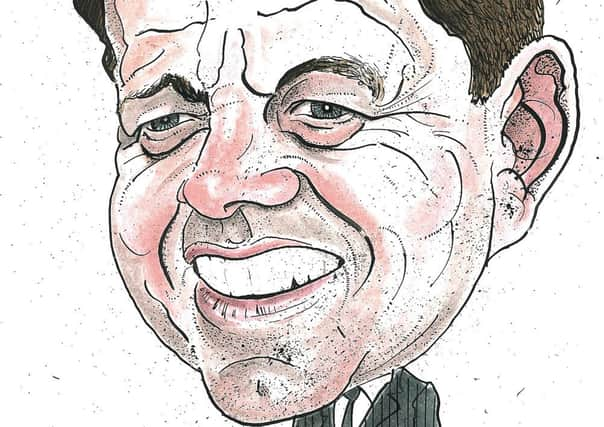Richard Heller: JFK - a presidency defined by the moments world held its breath


I was at Repton School in Derbyshire watching a play when the audience became distracted by garbled rumours which were later confirmed to be true.
However, I remember equally vividly waking up to the news of his election, and rushing to my primary school to gloat with the other American pupil there.
Advertisement
Hide AdAdvertisement
Hide AdFor us, Kennedy was the good guy in the movie, overcoming the devious, sinister Richard Nixon. He was the kind of dad who made you envious of other kids: young, athletic, stylish, a war hero, clever but casual, strong but light-hearted.
Kennedy’s victory was exhilarating, in a way unmatched until Barack Obama won in 2008. He made people believe his campaign rhetoric of renewal. After the drab, torpid Eisenhower presidency, Kennedy offered a new impulse of energy and creativity, not just to American government but to American life.
Years later the Eisenhower years would be remembered more fondly – an interlude of Happy Days followed by a long era of Mad Men – but at the time, Kennedy became a role model for democratic rulers across the world.
After he promised “100 days” of action (in imitation of Franklin Roosevelt’s first term), Harold Wilson did the same on becoming Prime Minister. Modern politicians including Barack Obama, Tony Blair and David Cameron have also been in thrall to this timetable – forgetting that history’s first “100 days”, Napoleon’s return from Elba, were notably unsuccessful.
Advertisement
Hide AdAdvertisement
Hide AdKennedy was the first media President of the United States. His wafer-thin victory was given to him by television: his image in the presidential debates established his right to govern far more than his words (a majority of radio listeners thought that Nixon had won).
His campaign was the first to be reported and analysed in depth, as Theodore H White’s The Making Of The President established a new American political tradition. In office, with the help of his beautiful wife, he made his Presidency fashionable, hobnobbing easily with artists, intellectuals and movie stars.
Kennedy’s image may have been too successful for his posthumous reputation. Arguably, it was unmatched by his achievements. Two of his great commitments, on civil rights legislation and a comprehensive attack on poverty, were unfulfilled at the time of his death and had to await his far less fashionable successor.
Even among Kennedy’s admirers, there is a recent tendency to focus on his last 100 days, suggesting that only then did he discover how to be a great President. This readily leads to an excursion into “counterfeit history” in which Dallas does not happen, Kennedy wins a second term, matches Johnson’s achievements domestically and ends the Vietnam war.
Advertisement
Hide AdAdvertisement
Hide AdSuch speculation is futile, particularly on Vietnam. Kennedy deepened American involvement in Vietnam, prompted by promises of success from new methods of warfare by some of his “best and brightest” advisers.
By autumn 1963, he realised that those promises would not be met. He would have faced the same choice as Johnson, between withdrawal and escalation, and the same forces influencing his decisions. No one can know what response he would have made.
His memory is better served by reassessing what actually happened in his foreshortened presidency.
Using unabashed Keynesian methods, combining higher public spending and tax cuts, Kennedy gave the United States sustained economic growth: its GDP increased more in his three years and Johnson’s first than in Eisenhower’s eight.
Advertisement
Hide AdAdvertisement
Hide AdNearly three million new jobs appeared in this period. Although much of his anti-poverty agenda was stalled, the minimum wage was raised by 25 per cent and extended to 3.6 million additional workers. Kennedy successfully promoted trade liberalisation and gave his name to a round of negotiations which generated tariff cuts of more than a third in US–European trade.
Kennedy was slow to act on civil rights, but eventually he made an order barring segregation in federally financed housing. His brother Robert, as Attorney General, promoted racially integrated transport and schools and forced southern white election officials to allow black people to register and vote.
In foreign policy, Kennedy got off to a bad start with the Bay of Pigs invasion, but made a genuine effort to redefine American relationships with Latin America and the Third World generally. The Peace Corps is a lasting legacy.
He passed a supreme test of leadership in the Cuban Missile Crisis. I remember genuinely wondering at the time whether it was worth doing homework or whether the world would end before anyone marked it. The crisis had its roots in blunder and administrative failure: it was ended because Kennedy formed a realistic plan which asserted American interests without provoking the Soviet Union into a confrontational response which might have given both sides a choice between war or humiliation. Kennedy’s delayed reward was the Test Ban Treaty, the superpowers’ first negotiated limitation on nuclear weapons, which he rightly regarded as one of his greatest achievements.
Advertisement
Hide AdAdvertisement
Hide AdKennedy did not live to see one of his most dramatic legacies, the Moon landing, to which he committed the United States at the outset of his Presidency.
After saving the world from extinction, he gave it another moment to hold its breath.
• Richard Heller is an American-born writer and author. He was a policy adviser to Denis Healey.